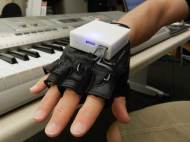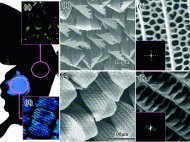Mobile Music Touch glove aids in touch sensation recovery
 After a year of sustained injury or illness, most of the individuals with limited feeling or movement in their hands due to quadriplegia see very little improvement in recovery for the remainder of their lives. Georgia Tech researchers have created Mobile Music Touch (MMT) – a wireless, musical glove that may improve sensation and motor skills for people with paralyzing spinal cord injury (SCI).
After a year of sustained injury or illness, most of the individuals with limited feeling or movement in their hands due to quadriplegia see very little improvement in recovery for the remainder of their lives. Georgia Tech researchers have created Mobile Music Touch (MMT) – a wireless, musical glove that may improve sensation and motor skills for people with paralyzing spinal cord injury (SCI).
MMT glove, which looks like a workout glove with a small box on the back, is used with a piano keyboard and vibrates a person’s fingers to indicate which keys to play. While learning to play the instrument, several people with SCI experienced improved sensation in their fingers.
The MMT system works with a computer, MP3 player or smart phone. A song, such as Ode to Joy, is programmed into a device, which is wirelessly linked to the glove. As the musical notes are illuminated on the correct keys on the piano keyboard, the gadget sends vibrations to “tap” the corresponding fingers. The participants play along, gradually memorizing the keys and learning additional songs.
“After our preliminary work in 2011, we suspected that the glove would have positive results for people with SCI”, said Ph.D. graduate Tanya Markow, the project’s leader. “But we were surprised by how much improvement they made in our study. For example, after using the glove, some participants were able to feel the texture of their bed sheets and clothes for the first time since their injury.”
In cooperation with Atlanta’s Shepherd Center, Markow worked with individuals with SCI who had limited feeling or movement in their hands. Each suffered a spinal injury more than a year prior to the study. The eight-week project required study participants to practice playing the piano for half an hour, three times a week. Half used the MMT glove to practice; half did not. The participants also wore the glove at home for two hours a day, five days a week, feeling only the vibration (and not playing the piano).
At the end of the study, participants performed a variety of common grasping and sensation tests to measure their improvement. The participants who used the MMT system performed significantly better than those who just learned the piano normally. According to Markow, some people were able to pick up objects more easily, and one of the participants said he could immediately feel the heat from a cup of coffee, rather than after a delay.
Markow believes the increased motor abilities could be caused by renewed brain activity that sometimes becomes dormant in persons with SCI. The vibration might be triggering activity in the hand’s sensory cortex, which leads to firing in the brain’s motor cortex. Georgia Tech researchers plan to expand the study and confirm the results of their system with functional MRI (fMRI) data.









Have you a marketing contact for these gloves. We would like to include them in Ability Magazine – the only technology for the disabled mag. in the UK>
author
i don’t believe these gloves have been commercialized in order to be marketed, however, you can try to contact Tanya Markow (project leader) over here:
– Google+
– LinkedIn
Where to buy
author
Hi Karl, I tried to find updates but no success. There are YouTube comments asking similar question on the still active video as the years went by and there are no answers by Georgia Tech.